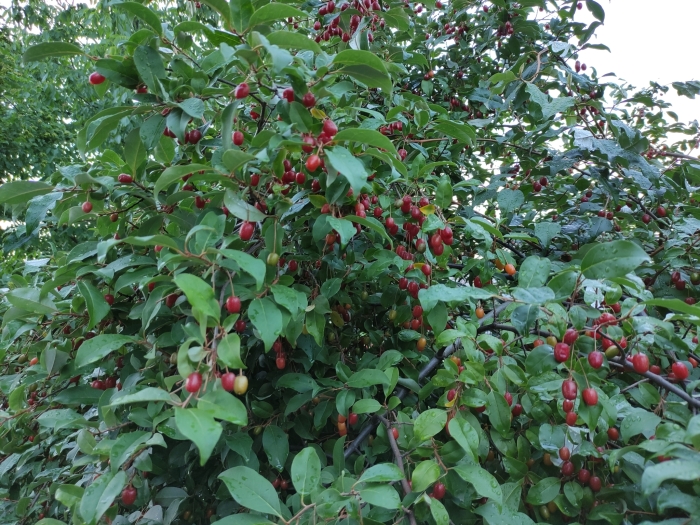Cherry Elaeagnus
(Elaeagnus multiflora)
Cherry Elaeagnus (Elaeagnus multiflora)
/
/

© Ihor
CC BY 4.0
Image By:
© Ihor
Recorded By:
Copyright:
CC BY 4.0
Copyright Notice:
Photo by: © Ihor | License Type: CC BY 4.0 | License URL: http://creativecommons.org/licenses/by/4.0/ | Uploader: ihorq | Publisher: iNaturalist |


















Estimated Native Range
Summary
Elaeagnus multiflora, commonly known as cherry elaeagnus or goumi, is a deciduous or semi-deciduous shrub native to a variety of habitats including open woodlands, forest edges, and along riverbanks in China, Korea, and Japan. It typically grows to a height of 6-10 feet (1.8-3 meters) and a similar width, with a dense, spreading form. The shrub is adorned with small, silvery flowers in late spring, which are subtly fragrant and followed by bright red, edible berries in early summer. The leaves are a distinctive green with silvery undersides, contributing to its ornamental value.
Cherry elaeagnus is valued for its adaptability to different soil types, including poor soils, and its ability to fix nitrogen, which can improve soil fertility. It is often used in permaculture gardens, as a hedge or screen, and for wildlife habitat, as the berries attract birds. In cultivation, it prefers full sun to part shade and tolerates a range of soil conditions, though it thrives in well-drained soils. Regular watering is recommended, especially in dry conditions. While generally low-maintenance, it can be susceptible to pests like scale insects and diseases such as leaf spot. Due to its potential invasiveness, it should be planted with caution and monitored for unwanted spread.CC BY-SA 4.0
Cherry elaeagnus is valued for its adaptability to different soil types, including poor soils, and its ability to fix nitrogen, which can improve soil fertility. It is often used in permaculture gardens, as a hedge or screen, and for wildlife habitat, as the berries attract birds. In cultivation, it prefers full sun to part shade and tolerates a range of soil conditions, though it thrives in well-drained soils. Regular watering is recommended, especially in dry conditions. While generally low-maintenance, it can be susceptible to pests like scale insects and diseases such as leaf spot. Due to its potential invasiveness, it should be planted with caution and monitored for unwanted spread.CC BY-SA 4.0
Plant Description
- Plant Type: Shrub, Tree
- Height: 6-10 feet
- Width: 6-10 feet
- Growth Rate: Moderate
- Flower Color: N/A
- Flowering Season: Spring
- Leaf Retention: Deciduous
Growth Requirements
- Sun: Full Sun, Part Shade
- Water: Low, Medium
- Drainage: Medium
Common Uses
Bee Garden, Bird Garden, Butterfly Garden, Edible*Disclaimer: Easyscape's listed plant edibility is for informational use. Always verify the safety and proper identification of any plant before consumption., Hedges, Low Maintenance, Street Planting
Natural Habitat
Native to open woodlands, forest edges, and riverbanks in China, Korea, and Japan
Other Names
Common Names: Goumi, Cherry Elaeagnus, Mu Ban Xia, Natsu-Gumi, Gumi
Scientific Names: , Elaeagnus multiflora, Elaeagnus edulis, Elaeagnus edulis, Elaeagnus edulis, Elaeagnus edulis, Elaeagnus isensis, Elaeagnus jucundicocca, Elaeagnus kiusiana, Elaeagnus kologa
GBIF Accepted Name: